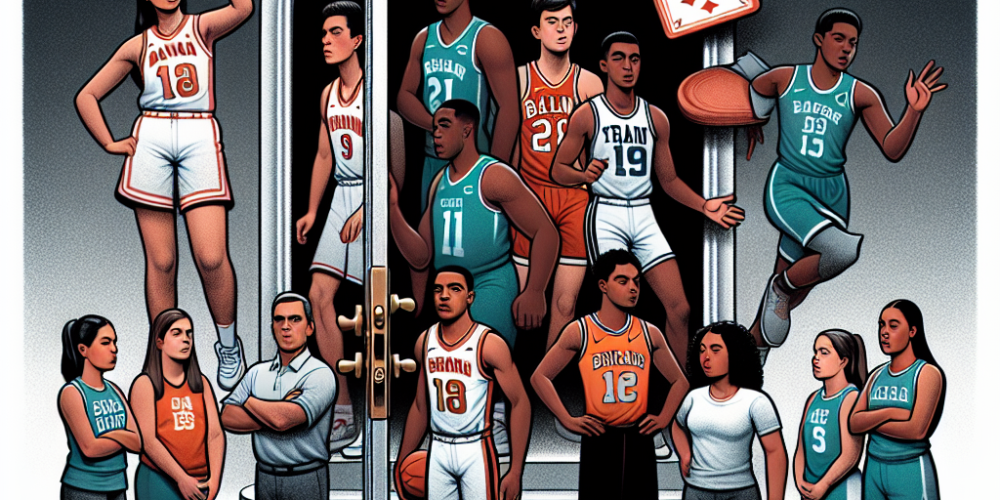In a decisive move to uphold the integrity of college sports, the National Collegiate Athletic Association (NCAA) has permanently banned three men’s basketball players for engaging in betting activities that compromised their own games. This action underscores the NCAA’s commitment to mitigating the adverse effects of sports wagering on athletes and maintaining the sanctity of collegiate sports.
The recent findings by the NCAA Committee on Infractions have brought to light the actions of former Fresno State teammates Mykell Robinson and Jalen Weaver, as well as Steven Vasquez, a guard from San Jose State. The investigation revealed that these athletes not only shared insider betting information but also placed bets on their own games, a severe violation of NCAA regulations.
In January 2025, Robinson and Vasquez were implicated in a scheme to profit from Robinson deliberately underperforming in a regular-season game. Text message evidence obtained during the investigation disclosed that Robinson informed Vasquez of his intention to fall short of expected statistics across several categories. The pair, along with a third accomplice, reportedly wagered $2,200 on Robinson’s “under” performance lines, yielding them nearly $16,000 in gains.
Further scrutiny uncovered that Robinson had placed around 13 daily fantasy sports prop bets throughout the season, some involving his own performance metrics. Before a game in December 2024, Robinson exchanged information about betting lines with Weaver, leading Weaver to place $50 parlay bets on himself, Robinson, and a third player, which resulted in a $260 return.
The NCAA’s alert was initially raised by suspicious betting patterns linked to Robinson’s performance props, flagged by Fresno State and a sports-betting integrity monitor. This prompted an investigation that exposed text communications, betting slips, and associated financial transactions, solidifying the case against the athletes.
Despite Robinson and Vasquez’s refusal to assist the investigators, Weaver admitted his participation in the betting scheme. Nonetheless, all three athletes faced permanent ineligibility under the NCAA’s stringent rules, which classify betting on one’s own games as a significant breach of ethical conduct. As legal sports betting gains traction in the United States, this case serves as a cautionary tale for other student-athletes who might be lured by the allure of quick financial gain.
This ruling from the NCAA emerges amid growing concerns about the influence of legalized sports betting on college sports. The association has urgently called for state regulators to ban player-specific prop bets for collegiate events, arguing that such wagers could incentivize match-fixing and expose student-athletes to undue pressure and potential harassment. The evolving landscape of prediction markets, characterized by ambiguous legal frameworks and minimal oversight, adds another layer of complexity to the situation.
While the NCAA’s stance remains firm, there are divergent opinions on the broader implications of sports betting in collegiate athletics. Some argue that a complete prohibition of player-specific bets might not completely eradicate the issue of unethical betting practices. They suggest that increased education and awareness among athletes regarding the risks and penalties associated with betting could be a more effective deterrent.
Moreover, with the expansion of legalized sports betting, there is an ongoing debate about the balance between regulation and personal freedom. Advocates for a more regulated approach contend that establishing clearer guidelines and robust monitoring systems could help mitigate risks without infringing on individual rights. They emphasize that a well-regulated betting environment could protect athletes and the integrity of sports while allowing responsible participation in betting activities.
On the other hand, critics of sports betting highlight the potential for corruption and the vulnerability of young athletes to these temptations. They stress that the pressures of performance, coupled with easy access to betting platforms, could lead to detrimental choices that not only tarnish individual careers but also harm the reputation of collegiate sports as a whole.
As the discussion around sports betting continues to evolve, the NCAA’s actions serve as a reminder of the high stakes involved in maintaining fair play and ethical standards in college sports. The organization remains vigilant in its efforts to safeguard the interests of student-athletes and uphold the values of amateur sportsmanship.
In the midst of these developments, the NCAA’s appeal for stricter regulations and proactive measures reflects a broader commitment to addressing the challenges posed by the burgeoning sports betting industry. As more states consider legalizing sports betting, the implications for college athletics will undoubtedly remain a key topic of concern, prompting further dialogue and policy considerations.
Ultimately, the case of Robinson, Weaver, and Vasquez highlights the complexities and risks associated with sports betting in the collegiate realm. It underscores the necessity for ongoing vigilance, comprehensive education, and collaborative efforts among regulatory bodies, institutions, and athletes to ensure that the integrity of college sports is preserved for future generations.

David Garato is a luminary in gaming journalism, renowned for peeling back the curtain on the gaming world with his witty and insightful commentary. A decade into weaving stories from the pixelated edges of indie games to the expansive universes of AAA titles, David’s work is a thrilling blend of analysis and adventure. When not writing, he’s live-streaming, sharing his gaming exploits with an engaged and growing audience. David doesn’t just write about games; he lives them, making him a trusted guide in the gaming community.
















